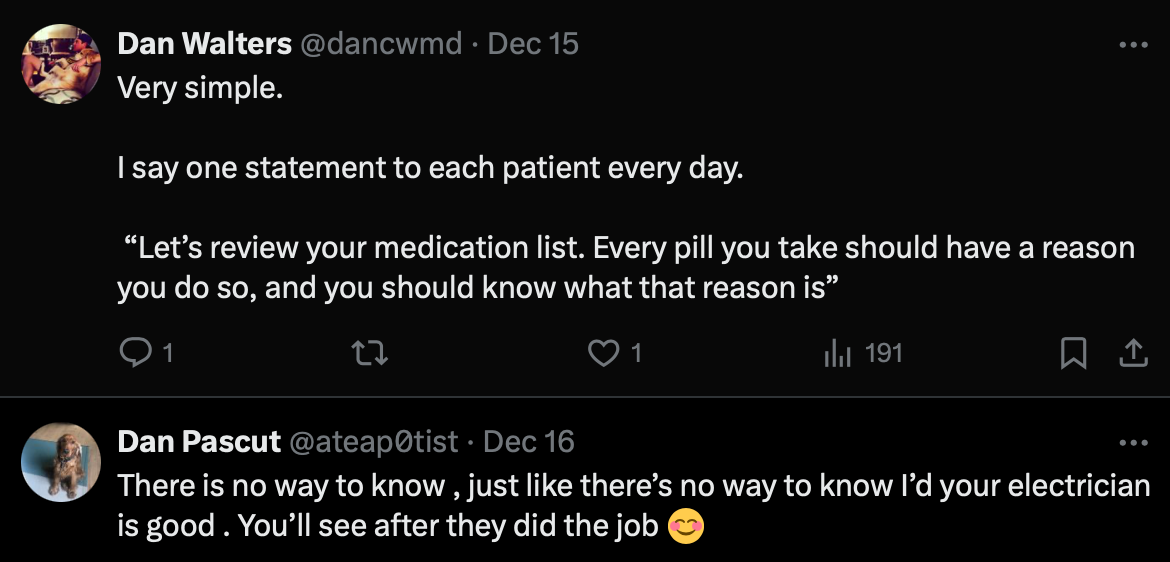Recently, an interesting thread unraveled on social media. The posts themselves, from various people, tell the story.
Good luck finding out how many patients your doctor of choice sees in an hour.
And good luck jumping over the hurdle of whether your doctor of choice is in your insurance network. Oh, and if you want to “interview” or meet with several doctors to help you make your choice, your insurance probably won’t cover the three visits you hoped for.
You may need more good luck because the most popular doctors often aren’t taking new patients. Many physicians have cut back or retired early after pandemic burnout.
There are numerous physician grading or rating services. But be ready to do your homework on them.
HealthGrades is a company that says it “takes the guesswork out of finding the right doctors, hospitals and care for you and your family.” But read the “independent evaluation” and “criticism” sections on this Wikipedia page to see questioning of “the reliability…lack of transparency and perceived oversights in Healthgrades’ methodology.”
WebMD lists HealthGrades.com alongside Vitals.com and RateMDs.com. But they note that all three accept advertising from physicians and on two out of three:
“Doctors who advertise are listed at the top of your search as “featured results”.
Where I live, MplsStPaul magazine has an annual “Top Doctors” edition. I don’t find these very helpful. If you want to find out online how the top docs were chosen, you have to go back to an article written 10 years ago. That doesn’t give me a lot of confidence, especially because COVID, politics, and many other factors have made big impacts on the delivery of health care in the past 10 years. 15 years ago the Star Tribune newspaper headlined that year’s results: “Top Doctors list is out again; how accurate is it?” Excerpt:
This year, the magazine mailed surveys to 5,000 randomly selected licensed doctors and nurses in the metro area. …
The magazine got 800 surveys back. That works out to a 16 percent response rate, too low to be representative, said (a U of Minnesota professor). "I'd like to see it a lot closer to 50 percent or 60 percent."
Still, he added: "In the land of the blind, the one-eyed man is king."
The U.S. Agency for Healthcare Research & Quality offers a list of “examples of comparative information on the quality of care provided by medical groups and clinics, physician practices, and/or individual providers.”
But my eyes are rolling back in my skull as I wonder who ever visits the links on the list, and how much do they understand once they get there.
My eyes kept rolling back further in my head when I read about “Online Reputation Management” help for doctors.
The marketing company behind this lists some “key components to online reputation management.” These include:
Monitoring. You should regularly monitor your online presence for reviews and patient feedback. There are a number of tools you can use to do this, including Google Alerts, Mention, and Hootsuite Insights.
Preventing. You can prevent negative reviews by proactively managing your online presence and reputation.
But do you really want your doctor spending time monitoring Google Alerts and “proactively managing” his/her online presence?
None of my doctors are on the local magazine “top doctors” lists. I’m very pleased with my primary care physician, my knee surgeon, and my ophthalmologist - all of whom I found by doing my own homework. Each is compassionate, an effective communicator, and a good listener. I bet none of them spends much, if any, time managing their online reputation.
In that social media thread that I quoted at the top of this piece, one person asked if the dilemma of finding a good doctor isn’t the same as finding any good professional anywhere. Yes, but…..there’s a little more riding on the choice of a physician. And as the social media thread above noted, it may be one of the most difficult and important questions in health care.
Please share your experiences. How did you make a choice? How did you try to decide who’s a “good doctor.” What, if any, resources helped you make a choice? And what didn’t help?













This article raises an excellent question, "How to find a good doctor?" Some thoughts below.
I think before we make a decision of “finding a good doctor,” we need to ask the following two questions:
1. What characteristics make a good doctor?
2. What do I want from my doctor?
The first one is a little easier to answer, but harder to find all the qualities in a single person. Example of some qualities are:
- Compassionate
- Smart and knowledgeable
- Up to date with current literature
- Balances science with art of medicine
- Good communicator
Some doctors are very smart & knowledgeable but may not be good communicators or rushed & hurried. Others may be very compassionate & good listeners while not managing the medical problems in a timely manner.
The question, "What do I want in my doctor?" is one that people often don't ask themselves. Personally, I take a very conservative approach and make this clear to patients when I first meet them. However, new patients who have heard good things about me sometimes come in asking for referrals for conditions like hypertension and diabetes—only to become upset when I explain that we can manage these conditions in our office.
Another ignored aspect of finding a good doctor is the office staff. The doctor may be excellent, but if the office staff is rude, negligent or unresponsive it often negates the point of having a good doctor.
Last but not least, our broken healthcare system often takes good doctors and places them in bad situations, leading to mediocre performance. How often do we see a doctor's office get bought out by a large system, only for the quality of care to decline? (I write about about these issues www.pcplens.com)
By the way, publications listing top doctors are completely useless and are advertisements in disguise. As a private practice owner, every year I get calls from 1-2 (smaller) publications asking if I want to be listed as a top doc for a fee.
Online reviews rarely reflect the quality of care provided. Upset individuals are often more motivated to leave negative reviews. Due to HIPAA regulations, doctors cannot provide context or respond, which can make them appear negligent. Additionally, some patients threaten doctors or office staff with bad reviews if their demands are not met, leading to an increasing trend of online bullying directed at healthcare professionals.
A more recent, personal observation on Healthgrades and similar physician rating services: I had finally gotten to the point that I needed two total knee replacements (TKRs). Now, I have very good research and technical skills -- certainly far above the average patient. I could certainly find some data on specific surgeons, but the number of reviews/ratings were low. It was exceedingly difficult to try to figure out what type of prosthetic to get, let alone what brand to select. To top it off, knee surgeons only install one or two models.
After days of research, I ended up selecting the son of a surgeon who had operated on our son for hip dysplasia 30 years earlier! He did fine (though I did have a rare misadventure on my second knee when they fractured my tibial plateau when pounding in the prosthetic...and then I woke up mid-surgery to see my open knee in the surgeon's monitor!). Things turned out okay, but my surgeon was *much* more attentive post-op than he was for the first TKR, as I'm sure he thought I might sue him. I can't do all the things I did before surgery, but I can still hang with Gary on the pickleball court (sort of)!